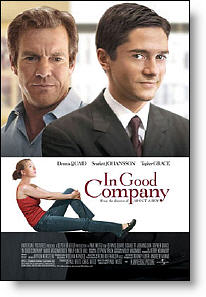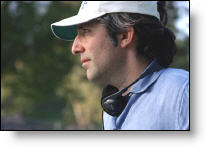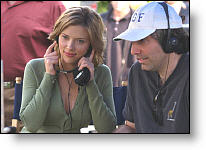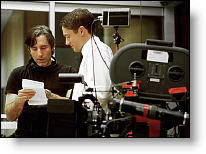Personal interview with the writer/director of “In Good Company”
by Chris Monroe
Staff Writer


Also see our film review of “In Good Company”
Sitting down with writer/director Paul Weitz in Los Angeles to discuss his latest film “In Good Company” gave me insight into some of his thoughts and motivations in making the film, as well as a glimpse into an intriguing project that lies ahead of him involving the current issue of faith in America.
Weitz explained why he chose to make “In Good Company.”
The intention was to do a character comedy, but also have it set against the backdrop of larger, social things.I was reading so much about.all the corporate mergers that were happening, and then hearing on an anecdotal level about people getting fired at a time in their life when they probably rightly thought that their experience would make them more valuable than ever. But consequently they were getting paid more—so they’re the first to get canned. So that’s why I set it in the corporate world.
Although Weitz has limited experience with office work, he was able to relate to the dynamics of the corporate world with his own experiences of working in Hollywood.
One of the most enjoyable aspects of the film was how well the humor was used. I told Weitz, I thought the humor was very straightforward, not “hammy,” and genuinely funny (New York audiences really responded). Weitz responded:
Thanks.A lot of it is set up in.pay-off character humor. I think there’s a certain kind of humor that the joke or the laugh line only works when it’s said by a particular character, because you feel like you’ve gotten to know that character. And that is certainly the attempt to be that kind of film where the laughter is coming from stuff you are observing about the characters.One’s always tempted to think.that “you never go broke underestimating the intelligence of the American public.” So you always wonder whether something is going to play or not. But it’s been gratifying to sit in an audience and see that they’re as quick as I would have hoped for.

Though the film carries overall more dramatic elements than comedic, it certainly provided plenty of entertainment in terms of humor.
Probing into the dramatic aspect of the film, I asked Weitz where the inspiration came from in portraying a young guy who doesn’t have a family and needs someone like Dennis Quaid’s character to be a mentor for him. Weitz said:
I think that there’s always a flip side to ageism, which is that, first off, the younger people.if they’re lucky, get to the position that they’re discriminating against. But also.there’s no set of apprenticeship system in business currently. And in a way there’s none in film anymore.While I met a bunch of great directors, I was never in a position where I was actually learning from somebody. I think that the older directors are worried the younger directors are going to be taking their jobs.
Anyway, it’s very easy to say Dennis Quaid’s character is being hurt by this situation, but then it’s sort of interesting to me to sort of look at how the younger guy [is] being hurt by the situation. I think that mentoring is something I’m very interested in because I think that there are certain things a mentor can tell you or show you that parents can’t. Because sometimes you sort of learn from failure and from, uh, pain. And your parents will always want you to not experience that, because they don’t want to worry.
So there are certain things where a mentor can tell you, “You’re acting like a jerk in this situation.” So, also, to me, it’s more interesting to have a character be a moving target.and to have one’s initial judgment about a character be revised during the course of the film.My great hero is Chekov. Even within the space of a short story, he was able to do a character that he made.feel real because you had to adjust your perceptions about that character.

Weitz went on to tell about his upcoming projects, which is stirring up a lot of interest.
I’m working on a couple of original ideas, probably the more promising of which is something exploring the role of faith in American culture right now—and whether there is a common ground between believers and non-believers. It’s a comedy.but with a lot of drama in it. But that’s sort of the thematic thing that I’m approaching it from.
Though he didn’t disclose details, just mentioning that kind of topic elicited a lot of interest, and therefore more questions. It sounded like the project is a little hush-hush, but Weitz did tell some more. He says:
I haven’t told anybody about it. This is the first time I’ve mentioned it, actually.With the last election it seems.interesting that there’s this feeling that there’s.going to have to be common ground. I assume the common ground is going to be in overlapping morality.
Finally I asked Weitz about his own personal faith in light of this upcoming project.
It’s very mixed. I’m part Catholic, part Jewish.When I was a little kid I would read the Bible.just out of superstition.
But I suppose I’m an agnostic. But I think one of the things I’m drawn to in filmmaking is trying to identify with characters who are not like me. So, I’m interested in giving everyone their due and letting the characters speak their mind.
Asked if he’s intimidated by taking on this kind of subject matter, he responded:
I think that doing comedy is like being an idiot savant: there’s one thing you’re good at, and maybe there’s implications beyond it. No, I’m not intimidated.all I want to do is films that aren’t boring. And it’s exciting to do something that’s sort of in the cultural vocabulary at the moment.
Read our review of “In Good Company”.